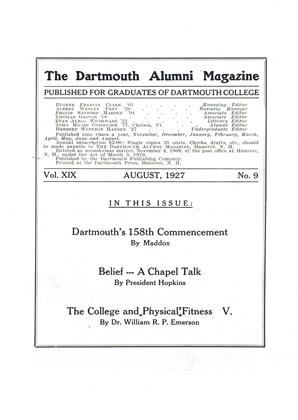By Evarts B. Greene, Houghton Mifflin Company. $5.00.
Dr. Greene, Dartmouth 1864, had brief service in the Civil War, graduated from Andover Theological Seminary 1869, and was missionary in Japan 1869 to 1913—forty-four years. The author, Dr. Greene's son, is professor of History in Columbia University.
Naturally, then the life line of the father is drawn through and over a broad background,— family inheritance, conditions and influences of the times, national movements; of which the author says, "as a historian by trade I have tried to present them as they were rather than as I could wish them to have been—to explain rather than to pass judgment." Sincerity, love of justice, sobriety are in his blood from ancestors of Puritan New England. Austere religion inherited, and fostered by Andover training, is softened as the years go by to advocacy of freedom of religious thought for others.
The records of boyhood are scant. Crosby "learned to use his hands effectively and got real intellectual discipline as well" from farm routine. As proprietor of a small, very small, lot of live stock he was trained in the responsibilities of ownership. It does not appear that he ever trapped a woodchuck or caught a trout. Of the College there are more details than of Greene. One wishes for more incidents during this period of development. He was a Psi U and a Phi Beta Kappa. He was seriousminded and religious but genial. His chief exercise was walking, but he could swim, on one occasion to the purpose of life-saving. It is not likely that he ever ate an unpurchased apple or blew a horn under a tutor's window. Frivolity or sport do not seem to have entered his busy life.
There was a brief period of teaching; and Andover in the sixties, nearly twenty pages.
His life work began as the first missionary of the American Board in Japan and was therefore contemporary with Japan's great progress,—not only with but of it. In following these splendid years of Christian work in and for Japan Professor Greene wisely draws broad sketches of current movements and his father's relation to them. Among the topics thus discussed are centralized and representative government, the treaty ports, colleagues in other missions and later in his own, missionary problems, the translation of the Bible, exterritoriality, the relations of the Japanese churches, the Doshisha and its difficulties, theological differences. His increasing educational and literary influence and his close relations to Japanese of rank and power and to other men of note in public life is clearly shown.
Referring to that brief experience in teaching the biographer says, "One of his Lake Forest pupils described nearly fifty years later his boyish impressions of the young teacher, 'We were young rascals and a great grief to him at times; and he always. took the kindly human way with us.' In 1909 this pupil of 1867, as a member of the Dartmouth faculty, presented his old teacher for an honorary degree from their common Alma Mater." Sixty years from those Lake Forest days that youthful pest writes these words and adds the expression of his great pleasure in an extended interview with this distinguished man, at that time. "In conferring the degree (Doctor of Laws), his old friend, President Tucker, spoke of Greene's forty years of leadership in the movement to establish the Christian religion in Japan, and 'his constructive statesmanship in cementing the bonds between Japan and other peoples.' "
 View Full Issue
View Full Issue
More From This Issue
-
 Article
ArticleDARTMOUTH'S 158TH COMMENCEMENT
August 1927 -
 Article
ArticleTHE COLLEGE AND PHYSICIAL FITNESS V.
August 1927 By William R. P. Emerson, M. D., -
 Article
ArticleJUNE MEETING OF ALUMNI COUNCIL
August 1927 By J. R. Chandler '98, Clarence G. McDavitt '00 -
 Article
ArticleTRUSTEES HOLD MEETING IN HANOVER
August 1927 By Hanover, N. H.,, E. K. Hall -
 Sports
SportsSUMMARY OF ATHLETIC SCORES
August 1927 -
 Class Notes
Class NotesCLASS OF 1921
August 1927 By Herrick Brown
Edwin J. Bartlett
-
 Letters to the Editor
Letters to the EditorALUMNI OPINION
January, 1911 -
 Letters to the Editor
Letters to the EditorLetters to the Editor
DECEMBER 1929 -
 Article
ArticleDR. NATHAN SMITH'S LECTURE ON CHEMISTRY
March, 1911 By Edwin J. Bartlett -
 Article
ArticleYears Loaded with Recollections
FEBRUARY 1929 By Edwin J. Bartlett -
 Article
ArticleThe Vicissitudes of South Hall
APRIL 1929 By Edwin J. Bartlett -
 Article
ArticleThe College
September 1976 By Edwin J. Bartlett
Books
-
 Books
BooksFACULTY PUBLICATIONS
December 1916 -
 Books
BooksBriefly Noted
FEBRUARY 1970 -
 Books
BooksSTUDIES OF HIGHWAY DEVELOPMENT AND GEOGRAPHIC CHANGE.
February 1960 By H. WENTWORTH ELDREDGE '31 -
 Books
BooksTHE EAST COAST OF SOUTH AMERICA
July 1940 By Mildred S. Saunders -
 Books
BooksEARNING OUR HERITAGE:
June 1938 By Stearns Morse. -
 Books
BooksALGEBRA AND TRIGONOMETRY.
JUNE 1967 By WILLIAM R. COGSWELL '61


